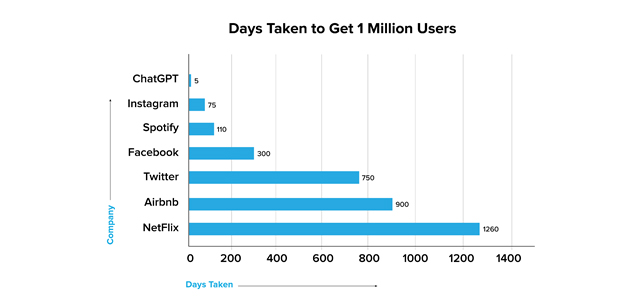
AI-Driven Innovation: Shaping the Future of Work with Generative AI


In 1950, Alan Turing proposed the ‘Turing Test,’ which assessed a machine's capacity to convincingly simulate human intelligence, blurring the line between artificial and human capabilities. Since then, artificial intelligence has come a long way, evolving significantly. The current buzz is all about generative AI and tools like OpenAI’s ChatGPT, Microsoft’s Azure OpenAI Service, Amazon Bedrock, and Google Bard.
Though the tech world has witnessed many disruptive technologies before, the impact of generative AI tools on the workplace will be unprecedented. History has taught us that innovations cause revolutions! But notice how the pace of innovation has accelerated. The First and Second Industrial Revolutions had a difference of more than a hundred years, while the Fourth Revolution of the Internet and now, the time of generative AI, happened in a mere twenty years. The next one might transform the technology landscape in months or even days.
If you consider the virality of trend-setting technologies, Netflix took 3.5 years to garner 1 million users, Facebook took ten months, and Instagram took 2.5 months. In a staggering move, ChatGPT garnered 1 million users in only five days.


Generative vs. Predictive Intelligence
An example of predictive intelligence is Netflix suggesting ‘what to watch next’ using your watch history. It analyzes historical data, patterns, and trends to make predictions and forecasts about future events or outcomes.

The thing of the future that continues to create waves and is poised to disrupt the entire human workforce is generative intelligence. GPT, or Generative Pre-trained Transformer, is the flag bearer of generative AI. ChatGPT is a chatbot developed as a fine-tuned version of GPT-3.5, which belongs to a family of large language models released by OpenAI.
ChatGPT achieved an astounding growth of 9,900% in its user base within 60 days of its launch, making it the fastest-growing platform in history (January 2023). According to YouGov, content creation reliance on ChatGPT is evident, with 17% of 30 to 44-year-olds and 15% of 18 to 29-year-olds embracing its capabilities. These facts are a testament to ChatGPT’s rapid adoption across all age groups. Hence, generative AI holds the power to transform the future of every workplace.
AI and the human workforce: A complement or a substitute?

Recently, IBM reported its plan to replace nearly 8,000 jobs with AI. Another report by Goldman Sachs revealed that up to 300 million full-time jobs worldwide could be affected by the latest wave of AI technology. On the contrary, the Organization for Economic Cooperation and Development survey concluded that technology will not eliminate but transform 1.1 billion jobs over the next decade.
While the debate about its intensity may be ongoing, it is true, AI will change the way business processes function. Here’s how:
Marketing

ChatGPT can support marketers in unleashing human creativity by increasing their capacity to ideate and innovate. One can develop a brand identity, and craft compelling emails, or create content that would otherwise take months to develop. It can even help create aesthetic designs for website layouts or banners. ChatGPT can generate social media captions, hashtags, create visuals, and identify the KPIs for campaigns too.
Sales and Operations
Teams have started to leverage AI to provide better customer support and service. Chatbots eliminate the need for basic backend customer support, so they can focus on more complex issues. AI can be used to automate sales calls, handle routine inquiries, or perform basic troubleshooting.

Human Resources
AI like ChatGPT can automate repetitive tasks like generating job descriptions, resume screening, and candidate sourcing. It can provide instant answers to common employee queries, improving internal communication so that HR professionals can focus on strategic initiatives.
Information & Technology

Generative AI tools can provide code templates and offer suggestions for code implementation. It can assist in system configuration and deployment, troubleshooting, and debugging. For a deeper knowledge about AI and its uses in the field, consider AI-900: Microsoft Azure AI Fundamentals, and AI-102: Designing and Implementing a Microsoft Azure AI Solution certifications. There are also many other free learning sessions for gaining unique insights on the topic of generative AI. Many organizations are already utilizing resources to upskill their teams to leverage generative AI to upgrade the quality of practices in their workplaces.
Thus, it is more likely that generative AI will be integrated into existing workflows, enabling human professionals to focus on more complex tasks while relying on AI for support and assistance. However, the human workforce's expertise, critical thinking, and contextual understanding are vital and unlikely to be fully substituted by AI.
The Battle of Thrones: Generalists vs Specialists
As AI becomes proficient in diverse tasks, enabling generalists, the demand for specialists faces uncertainty. In the past, specialists held the upper hand, but now, employers driven by cost-effectiveness and agility might lean towards the versatility and adaptability of generalists.
Both generalists and specialists play important roles. Generalists provide interdisciplinary perspectives, while specialists drive advancements with deep domain knowledge. However, both specialists and generalists must continuously upskill to keep pace with evolving technologies. By expanding their knowledge and leveraging AI tools, specialists can enhance their expertise and explore AI's potential applications in their domains. Case in point, neurosurgeons cannot be replaced by AI, but it can enable them to make the diagnosis more accurately and much faster.
When it comes to the world of Information & Technology, AI & cloud technologies dominate the landscape. Be the top 1% of the field by gaining mastery over cloud concepts and the fundamentals of AI.
Bhavesh, the visionary Founder & CEO of CloudThat is shaping the future of the Cloud. With work stint at AWS & Microsoft, now he's empowering professionals & businesses with Cloud, Data & AI and DevOps.
Brand Solutions is a marketing initiative for sponsored posts. No TechCircle journalist was involved in the creation of this content.

